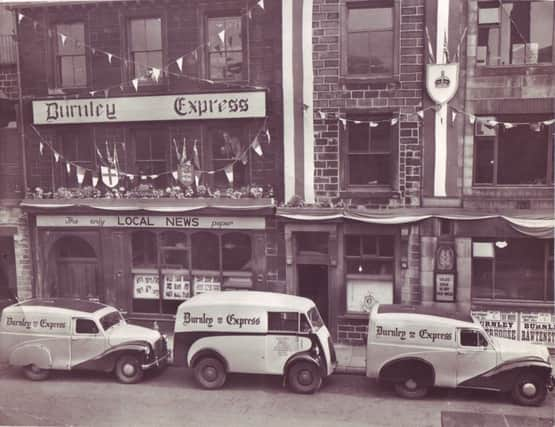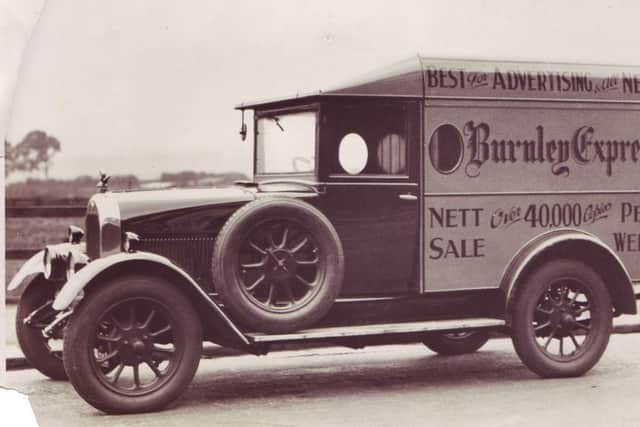Political persuasions of early Burnley press


In Burnley we are used to the Burnley Express but how many of you realise that the Express was founded as a Conservative newspaper in 1877?
I have thought, perhaps erroneously, that the blue boarders used on the Burnley Express bill boards, found outside newsagents, may be the last vestige of the newspaper’s former political bias.
Advertisement
Hide AdAdvertisement
Hide AdThe Burnley Express was not the only local newspaper published in the town in the past. The other political parties – the Liberals and later Labour – had their supporters in the press, but before we look at them we ought to start at the beginning.


Burnley came very late to having its own newspaper. This may have been a function of the fact that, despite having a medieval church and a history of manorial and paternal government, Burnley is essentially a new town.
It was the Industrial Revolution of the late 18th and early 19th centuries which transformed Burnley from a small and sleepy agricultural community remote from the political world into a bustling industrial town.
Industrialisation did not immediately result in higher standards in education. In fact, for a time, in places like Burnley, the opposite might have been the case.
Advertisement
Hide AdAdvertisement
Hide AdA new potential readership of a local newspaper was not created when the cotton mills, mines and iron works were established. Many of those who worked in these places remained only semi-literate.


Burnley remained relatively self-contained perhaps longer than many other places, even locally. These circumstances were not conducive to the establishment of a local press in our town.
It was not until the 1840s that something like a local newspaper was published here in Burnley. The publication, the Cottager’s Magazine, was not really a newspaper but it did contain news items among the more usual moral and religious advice.
In fact, I have wondered why the Cottager’s Magazine was so-called? It could have been given this name to appeal to the “cottage dwellers” of the town. They were occupied by cotton spinners and weavers and even they would not have called their homes “cottages”.
Advertisement
Hide AdAdvertisement
Hide AdIn 1846 the Burnley Bee appeared. This was short-lived but it was more of a newspaper than the Cottager’s Magazine had been.
It was not until March 1852 that Burnley got its first newspaper, a monthly, named the Burnley Advertiser. The proprietor was William Waddington and the editor was T. B. Spencer, a former mill worker and Sunday School teacher. In 1856 this paper became a weekly, published on a Saturday.
Reading the surviving early editions of the Burnley Advertiser little of a political bias can be detected. In fact, the name chosen was descriptive of its purpose – to give local businesses the opportunity to place their services before the public.
Constant with most Victorian newspapers, the front page was given over to adverts which also occupied much of the rest of the newspaper.It was not until a decade later that the politics in our local newspapers came to the fore. The catalyst is likely to have been the campaign for the Second Reform Act, which was eventually passed by Disraeli’s government in 1867.
Advertisement
Hide AdAdvertisement
Hide AdThe more influential Burnley residents had been upset that Burnley had not been granted its own Member of Parliament when the Great Reform Act of 1832 was passed. They were determined not to miss out this time, and although the town still did not have its own council, it is clear that, by the 1860s there was more party politics in Burnley than appears to have been the case before.
Burnley men, and it was mainly men, were also aware that it was not only direct representation in Parliament that was the issue. The two main parties of the day – Conservatives and Liberals – were generally in favour of extending the franchise (the right to vote) not to women, of course, but to more men. The more radically minded decided to set up their own local newspaper and, in 1863, the Burnley Free Press was established. This newspaper was a supporter of Gladstone on the Reform issue and, it therefore, appealed to the Liberals of the town.
In a short space of time the Free Press changed its name to the Burnley Gazette, and as the Advertiser, took a more Conservative line, the town now had two local newspapers, one each for the two main parties. As has been indicated, the Burnley Express was not founded until 1877 but, three years later, it took over the Burnley Advertiser combining the two Conservative newspapers into one.
A leading light, at the early Express, was Sir John Thursby, whose uncle, General Scarlett, had stood as the Conservative candidate at Burnley’s first parliamentary election in 1868.
Advertisement
Hide AdAdvertisement
Hide AdSir John, who had been much criticised by the local Liberal press, took a controlling interest in the Express and appointed Lawrence Brotherton, of Sabden, as editor. In 1890 the Brotherton family bought the Express which remained a distinctive Conservative newspaper.
By this time Socialist political parties were becoming active locally. This was partly through the trade union movement but there was another string to the bow of left wing politics in Burnley, the Social Democratic Federation.
The SDF which, though it was not based in Burnley, had a very strong presence here. The party was financed by a London stockbroker, H. M. Hyndman, who had offices in St James Hall (the home of the present Barclay’s Bank).
One left wing paper went by the name of the Burnley Socialist, which lasted two years, and another was known as the Burnley Radical though it only manged the publication of three issues.
Advertisement
Hide AdAdvertisement
Hide AdThis latter newspaper, and the similarly named (and Burnley based) East Lancashire Radical (ELR), had more in common with traditional Radicalism rather that Socialism but the ELR could only survive for 23 issues.
The other great left wing movement in Burnley was the Co-op. which helped to create the present Labour Party. Cleverly, the Burnley Co-op., when it established its own publication did not concentrate on political campaigns, but on the social improvement of its readership.
However, Burnley’s two main political newspapers remained the Express and the Gazette until the First World War.
The papers took different stances on the issues of the day, like Irish Home Rule, and it is easy to determine which paper was Conservative and which was Liberal. In 1913, the Burnley Gazette was relaunched as the Burnley News and 20 years later, in 1933, the two local papers amalgamated as the Burnley Express and News.
Advertisement
Hide AdAdvertisement
Hide AdThe days of party political rivalry in our newspapers was over. It had lasted for 60 years or so but, in that time, there had been intense rivalry between our newspapers, only some of which have been covered in this article.
Running a local newspaper was something of a cut-throat business when feelings ran particularly high.
The demise of the Burnley News might have had something to do with the decline of the Liberal Party but, since 1933, the Burnley Express has tried to eschew local party political politics. Our ancestors would not have thought that possible!